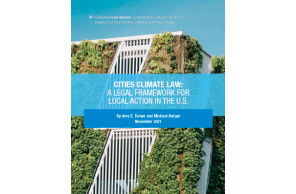By Amy Turner and Michael Burger
Cities around the U.S. have long demonstrated leadership on climate change, with more than 170 of them having set targets to phase out fossil energy and many others committing to net zero greenhouse gas emissions. American cities, towns, counties, and other forms of local government have pioneered path-setting approaches to economy-wide decarbonization, including market-moving clean energy procurements, remaking the building construction landscape, routing polluting vehicles out of center cities, and much more.
Many of these cities have also foregrounded equity and climate justice in their carbon mitigation policies, seeking to improve everyday lived experiences for frontline residents.
A new Sabin Center report, Cities Climate Law: A Legal Framework for Local Action in the U.S., by Amy Turner and Michael Burger, offers a comprehensive guide for local law- and policy-makers in developing climate programs that consider and comport with federal and state law. While cities face considerable legal hurdles in enacting local climate policy, they also have significant authority to develop novel policies that can slash greenhouse gas emissions while cutting local air pollution, expanding access to opportunity, and making our cities more equitable places to live, work, and play. Cities
Climate Law can help local governments move from pledges to action by demystifying the legal context in which they develop climate policy.
The law of carbon mitigation at the local level is a broad discipline, straddling federal, state, and local laws, regulations, requirements, programs, and other actions. It draws from bodies of law as diverse as
environmental, energy, municipal, construction, contractual, vehicle and traffic, civil rights, constitutional, and privacy law, and applies to carbon-reducing activities across the building, transportation, energy, and waste sectors. It is also informed by the significant work done by environmental justice and climate justice law and policy experts and advocates.
Cities Climate Law delineates the legal context applicable to the following areas:
You may view the latest post at
http://blogs.law.columbia.edu/




